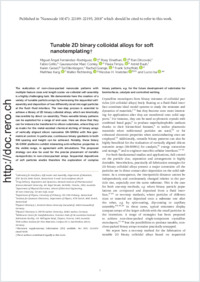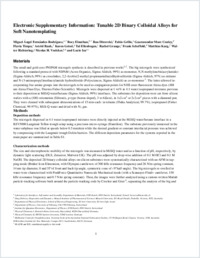Tunable 2D binary colloidal alloys for soft nanotemplating
- Fernández-Rodríguez, Miguel Ángel Laboratory for Interfaces, Soft matter and Assembly, Department of Materials, ETH Zurich, Switzerland
- Elnathan, Roey Drug Delivery, Disposition and Dynamics, Monash Institute of Pharmaceutical Sciences Monash University, Parkville, Australia
- Ditcovski, Ran Department of Physical Electronics, School of Electrical Engineering, Tel Aviv University, Israel
- Grillo, Fabio Laboratory for Interfaces, Soft matter and Assembly, Department of Materials, ETH Zurich, Switzerland
- Conley, Gaurasundar M. Department of Physics, University of Fribourg, Switzerland
- Timpu, Flavia Institute for Quantum Electronics, Department of Physics, ETH Zurich, Switzerland
- Rauh, Astrid Physical Chemistry I, Heinrich-Heine-University Duesseldorf, Germany
- Geisel, Karen Physical Chemistry II, RWTH Aachen University, Aachen, Germany
- Ellenbogen, Tal Department of Physical Electronics, School of Electrical Engineering, Tel Aviv University, Israel
- Grange, Rachel Institute for Quantum Electronics, Department of Physics, ETH Zurich, Switzerland
- Scheffold, Frank Department of Physics, University of Fribourg, Switzerland
- Karg, Matthias Physical Chemistry I, Heinrich-Heine-University Duesseldorf, Germany
- Richtering, Walter Physical Chemistry II, RWTH Aachen University, Aachen, Germany
- Voelcker, Nicolas H. Drug Delivery, Disposition and Dynamics, Monash Institute of Pharmaceutical Sciences Monash University, Parkville, Australia - Melbourne Centre for Nanofabrication, Victorian Node of the Australian National Fabrication Facility, Clayton, Australia - INM-Leibniz Institute for New Materials, Saarbrücken, Germany
- Isa, Lucio Laboratory for Interfaces, Soft matter and Assembly, Department of Materials, ETH Zurich, Switzerland
-
06.12.2018
Published in:
- Nanoscale. - 2018, vol. 10, no. 47, p. 22189–22195
English
The realization of non-close-packed nanoscale patterns with multiple feature sizes and length scales via colloidal self-assembly is a highly challenging task. We demonstrate here the creation of a variety of tunable particle arrays by harnessing the sequential self-assembly and deposition of two differently sized microgel particles at the fluid–fluid interface. The two-step process is essential to achieve a library of 2D binary colloidal alloys, which are kinetically inaccessible by direct co-assembly. These versatile binary patterns can be exploited for a range of end-uses. Here we show that they can for instance be transferred to silicon substrates, where they act as masks for the metal-assisted chemical etching of binary arrays of vertically aligned silicon nanowires (VA-SiNWs) with fine geometrical control. In particular, continuous binary gradients in both NW spacing and height can be achieved. Notably, these binary VA- SiNW platforms exhibit interesting anti-reflective properties in the visible range, in agreement with simulations. The proposed strategy can also be used for the precise placement of metallic nanoparticles in non-close-packed arrays. Sequential depositions of soft particles enable therefore the exploration of complex binary patterns, e.g. for the future development of substrates for biointerfaces, catalysis and controlled wetting.
- Faculty
- Faculté des sciences et de médecine
- Department
- Département de Physique
- Language
-
- English
- Classification
- Physics
- License
- License undefined
- Identifiers
-
- RERO DOC 323885
- DOI 10.1039/C8NR07059H
- Persistent URL
- https://folia.unifr.ch/unifr/documents/307493
Other files
Statistics
Document views: 80
File downloads:
- sch_tbc.pdf: 208
- sch_tbc_sm.pdf: 162

